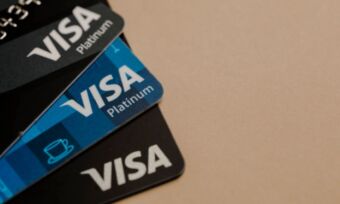How do you default on your credit card?
You will have defaulted on your credit card if your payment has been overdue for at least 60 days and the overdue payment is $150 or more. Your credit card provider must also have sent you two separate notices about the overdue payment. In the second notice, your provider should let you know that if you don’t make a payment, the credit provider will disclose this to the credit reporting body. Credit card defaults will stay on your credit report for five years.
It’s worth distinguishing credit card defaults from other types of late payments. If you make a credit card payment more than 14 days after the due date, this can be listed as a late payment on your credit report as part of your repayment history. This will stay on your report for two years.
If your payment was less than 14 days late, this won’t be recorded on your report, but you may still be charged a late fee by your credit card provider and lose any interest-free period that your card has.
A serious credit infringement is another type of late payment. Providers can report a serious credit infringement if you owe a debt and the provider hasn’t been able to contact you for at least six months and they think you don’t intend to pay the agreed amount. Serious credit infringements stay on your report for seven years.
What happens when you default on your credit card?
Defaulting on your credit card can have serious consequences. As mentioned, a credit card default will stay on your credit report for five years. This can have a negative impact on your credit score and can make it harder for you to get a loan or credit in the future.
You can’t get rid of a default on your credit report. But if you pay the money owed, this will be noted on your credit report. If you are able to pay other loan or credit products on time, this could also help reduce the negative impact of the default on your credit report and score.
If you fail to make your credit card repayments over a period of time, the Australian Banking Association says your bank could cancel your credit card and, in rare circumstances, it may sell your credit card debt to a debt collector. It could also start legal action to recover the money you owe.
If you are struggling with credit card debt, it’s important to contact your credit card provider and see if you can come to a financial hardship repayment arrangement.
You can also contact a free financial counsellor for help. You can speak to a financial counsellor by calling the National Debt Helpline on 1800 007 007. Once you give a hardship notice, your credit provider must stop further enforcement or legal action until you receive a response (unless it has a court judgement).
How to deal with debt collectors
If you default on your credit card repayments, you may be contacted by a debt collector. If this happens, it’s important to understand your rights.
If you are contacted by a debt collector, you should try to cooperate with them while also being honest about your financial situation (including other debts you have). The Federal Government’s Moneysmart website recommends replying in good time to their calls or letters, considering a payment plan if you can afford it and letting them know if your contact details change.
Debt collectors must respect your right to privacy and there are restrictions on how and when they can contact you. You should be treated in a professional way and debt collectors are not allowed to harass or intimidate you. If a debt collector is harassing or intimidating you, you can send a complaint to the debt collector or to the Australian Financial Complaints Authority (AFCA).
Tips to stay ahead of your credit card debt
Defaulting on your credit card can have long-lasting consequences, so it’s important to stay on top of your credit card debt and avoid missing your repayments. Here are four steps that could help:
- Consider a credit card with a 0% balance transfer offer: One option could be to transfer your existing credit card debt to a credit card with a 0% balance transfer offer. This allows you to pay off your debt interest-free for a period of time, which could make it more manageable. But make sure to weigh up the pros and cons carefully.
- Consider switching to a low rate credit card or personal loan: You could also consider switching to a low rate credit card so more of your repayments go towards paying off your debt, rather than interest. If you have multiple debts, another potential option is a debt consolidation loan.
- Set up payment reminders: Make sure you know your payment due date and set reminders. Set notifications on your phone, mark the date in your diary or see if you can set up email or SMS reminders through your credit card provider.
- Pay more than the minimum repayment if you can: If you are able to pay off your balance in full each month, this could help you avoid paying interest on purchases you make using your card.








